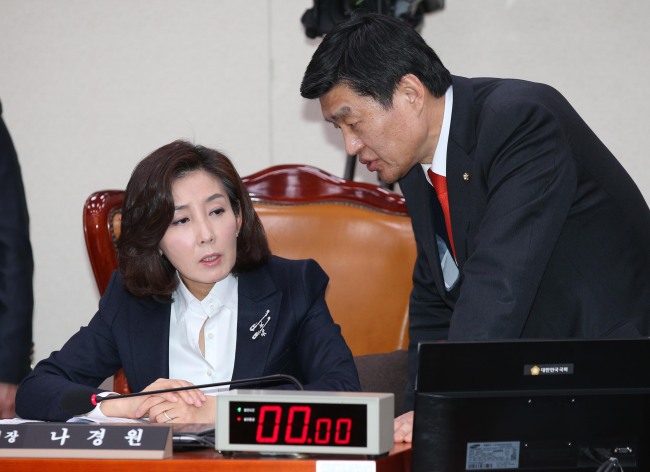The leader of the National Assembly’s Foreign Affairs Committtee said Monday that South Korea should consider a change of regime in North Korea as an option to fend off Pyongyang’s security threats.
“I think we should now think about all options (toward the North), including regime change,” Rep. Na Kyung-won said in a radio interview with local broadcaster KBS.
 |
| Rep. Na Kyung-won (Yonhap) |
The third-term Saenuri lawmaker defended President Park Geun-hye’s decision to shut down cross-border industrial complex, saying that it was “inevitable” to impose tougher sanctions on the reclusive regime along with the international community and regional allies.
Na’s remarks came on the heels of heightened tension on the Korean peninsula following North Korea’s fourth nuclear test on Jan. 6 and sixth long-range rocket launch on Feb. 7.
The launch also promoted main opposition party leader Kim Jong-in, formerly an economist with a conservative background, to say the North would eventually be “destroyed.”
On the same day, Saenuri Party floor leader Rep. Won Yu-chul joined in to demand that the government take a hardline approach toward the North. In his Assembly address, Won urged the government to acquire nuclear weapons as a self-defense measure against the reclusive regime’s relentless nuclear ambition.
“We have to take extraordinary measures to prepare for changes in security landscape,” Won said. “Now we have to think about measures to ensure the nation’s survival including nuclear armament for self-defense.”
Highlighting that the two Korea’s 1992 joint declaration on denuclearization has lost its effectiveness following the North’s series of nuclear tests, the floor leader urged the government to shift away from its previous pledge not to pursue the development or deployment of nuclear weapons.
Defense Minister Han Min-koo, however, dismissed the idea. The minister said in a parliamentary hearing that the government has not considered an option to acquire nuclear weapons of its own or deploy U.S. tactical nuclear weapons on the Korean Peninsula.
South Korea is banned from developing nukes under the Nuclear Non-proliferation Treaty. Since signing the agreement in 1975, Seoul has joined other nonproliferation initiatives such as the Proliferation Security Initiative, a U.S.-led effort that seeks to intercept smugglers of unconventional weapons.
By Yeo Jun-suk (jasonyeo@heraldcorp.com)

